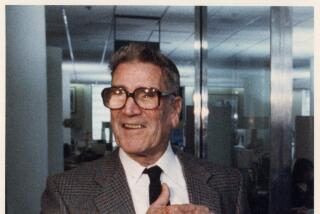Veteran CBS News Figure Harry Reasoner Dies at 68 : Broadcasting: The commentator, who preferred a light touch, was first co-editor of ’60 Minutes.’
- Share via
NEW YORK — Television newsman Harry Reasoner, whose elegant prose, dry wit and wry, self-effacing style helped make CBS’ “60 Minutes” newsmagazine one of television’s most popular shows, died Tuesday, the network said. He was 68.
Reasoner died at Norwalk Hospital in Norwalk, Conn., CBS News said in a statement. He had been hospitalized there since June 11. Doctors had removed a blood clot from his brain and he had also suffered from pneumonia.
Reasoner, whose silver hair and amiable grin were known to millions, was a four-time Emmy winner and the first “60 Minutes” co-editor, with Mike Wallace, in 1968.
“I’m not Walter Cronkite, but I can read a newscast pretty well,” he said in a 1969 interview. “I’m not Mike Wallace, but I can do a pretty good interview.”
On May 19, when he stepped down in his 15th season as a “60 Minutes” co-editor to become “editor emeritus,” he recalled being asked by producer Don Hewitt to make a pilot episode for the show.
“I said, ‘Sure,’ but I also said I didn’t think it would fly,” he said. “I’ve been wrong a lot, but never so happily wrong. I can’t imagine anything I could have done that would have been so rewarding.”
Reasoner joined CBS in New York in 1956, working his way up through the ranks as a radio and TV newscaster and commentator. He became known for his light touch with the news and a warm, personal style.
“I think light is just as much a part of news as heavy,” he said in 1969. “What I resent is the implication that merely because you see something funny, you are going to take that attitude toward everything.”
After 14 years at CBS, Reasoner left in 1970 to co-anchor “The ABC Evening News” with Howard K. Smith.
In 1975, he and Barbara Walters became network TV’s first male-female evening anchor team, but their collaboration soured and he rejoined CBS in 1978.
A native of Dakota City, Iowa, he was the son of Harry Ray Reasoner, a school superintendent, and Eunice Nicholl Reasoner, a teacher. In 1934, the family moved to Minneapolis, where he attended local schools.
Reasoner studied journalism at Stanford University and the University of Minnesota. In 1942, still in school, he worked for the now-defunct Minneapolis Times until he was drafted into the Army during World War II.
After being discharged from the service, he rejoined the Times in 1946 as a rewrite man and drama critic, but lost the critic’s job after panning a road company musical.
“It was one of the New York shows that came to Minneapolis,” Reasoner said in a 1961 interview, “and the theory was that you couldn’t criticize them or they’d stop coming there.”
His only novel, “Tell Me About Women,” was published in 1946 and was “warmly received,” Reasoner said. “That means it didn’t sell too well.”
His collected essays, “The Reasoner Report,” were published in 1966 and his memoir, “Before the Colors Fade,” was published in 1981.
After two years as a Northwest Airlines publicist, he returned to newswriting in 1950 at radio station WCCO in Minneapolis, a CBS affiliate. In 1951, he joined the U.S. Information Service and worked in Manila for three years.
He asked CBS for a job and was told to get some TV experience, so he returned to Minneapolis in 1954 as news director for KEYD-TV (later KSMP) until the network hired him in New York.
As a reporter, he covered racial strife in Little Rock, Ark., in 1958, the U.S. tour of Soviet leader Nikita Khrushchev in 1959 and toured the Far East with President Dwight D. Eisenhower in 1960.
He also was co-host of the network’s morning show “Calendar” from 1961 to 1963, anchored “The CBS Sunday News” from 1963 to 1970, and worked on the network’s “CBS Reports” documentaries and many news specials.
In 1965, he succeeded Dan Rather as White House correspondent.
In addition to his four Emmys and many professional honors, he won the George Foster Peabody award in 1967. In 1989, at age 66, he completed his University of Minnesota credits and got his bachelor’s degree in journalism.
Reasoner is survived by his wife, Lois, of Westport, Conn., and two sons and five daughters from his first marriage to Kathleen Carroll Reasoner, who died in 1986.
More to Read
The complete guide to home viewing
Get Screen Gab for everything about the TV shows and streaming movies everyone’s talking about.
You may occasionally receive promotional content from the Los Angeles Times.






